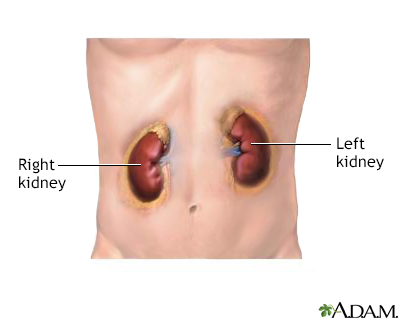Pregnancy SmartSiteTM
Renal transplant; Transplant - kidney DefinitionA kidney transplant is surgery to place a healthy kidney into a person with kidney failure. DescriptionKidney transplants are one of the most common transplant operations in the United States. One donated kidney is needed to replace the work previously done by your kidneys. The donated kidney may be from a:
The healthy kidney is transported in a special solution that preserves the organ for up to 48 hours. This gives the health care providers time to perform tests to ensure that the donor's and recipient's blood and tissue match. PROCEDURE FOR A LIVING KIDNEY DONOR If you are donating a kidney, you will be placed under general anesthesia before surgery. This means you will be asleep and pain-free. Surgeons today can often use small surgical cuts with laparoscopic techniques to remove the kidney. PROCEDURE FOR THE PERSON RECEIVING THE KIDNEY (RECIPIENT) People receiving a kidney transplant are given general anesthesia before surgery.
Kidney transplant surgery takes about 3 hours. People with diabetes may also have a pancreas transplant done at the same time. This can add another 3 hours to the surgery. Why the Procedure Is PerformedYou may need a kidney transplant if you have end-stage kidney disease. The most common cause of end-stage kidney disease in the United States is diabetes. However, there are many other causes. A kidney transplant may NOT be done if you have:
RisksSpecific risks related to this procedure include:
Before the ProcedureYou will be evaluated by a team at the transplant center. They will want to make sure that you are a good candidate for a kidney transplant. You will have several visits over a period of several weeks or months. You will need to have blood drawn and x-rays taken. Tests done before the procedure include:
You will also want to consider one or more transplant centers to determine which is best for you.
If the transplant team believes you are a good candidate for a kidney transplant, you will be put on a national waiting list. Your place on a waiting list is based on a number of factors. Key factors include the type of kidney problems you have, how severe your kidney disease is, what other conditions you have, such as heart disease, and the likelihood that a transplant will be successful. For adults, the amount of time you have spent on a waiting list is not the most important or main factor in how soon you get a kidney. Most people waiting for a kidney transplant are on dialysis. While you are waiting for a kidney:
After the ProcedureIf you have received a donated kidney, you will need to stay in the hospital for about 3 to 7 days. You will need close follow-up by your transplant team and regular blood tests for 1 to 2 months. The recovery period is about 6 months. Often, your transplant team will ask you to stay close to the hospital for the first 3 months. You will need to have regular check-ups with blood tests and x-rays for many years. Outlook (Prognosis)Almost everyone feels that they have a better quality of life after the transplant. Those who receive a kidney from a living related donor do better than those who receive a kidney from a donor who has died. If you donate a kidney, you can most often live safely without complications with your one remaining kidney. People who receive a transplanted kidney may reject the new organ. This means that their immune system sees the new kidney as a foreign substance and tries to destroy it. In order to avoid transplant rejection, almost all kidney transplant recipients must take medicines that suppress their immune response for the rest of their life. This is called immunosuppressive therapy. Although the treatment helps prevent organ rejection, it also puts patients at a higher risk for infection and cancer. If you take this type of medicine, you need to be screened for cancer. The medicines may also cause high blood pressure and high cholesterol and increase the risk for diabetes. A successful kidney transplant requires close follow-up with your doctor and you must always take your medicine as directed. ReferencesBarlow AD, Nicholson ML. Kidney transplantation surgery. In: Johnson RJ, Floege J, Tonelli M, eds. Comprehensive Clinical Nephrology. 7th ed. Philadelphia, PA: Elsevier; 2024:chap 108. Becker Y. Kidney and pancreas transplantation. In: Townsend CM Jr, Beauchamp RD, Evers BM, Mattox KL, eds. Sabiston Textbook of Surgery. 21st ed. St Louis, MO: Elsevier; 2022:chap 27. | |
| |
Review Date: 4/1/2025 Reviewed By: Kelly L. Stratton, MD, FACS, Associate Professor, Department of Urology, University of Oklahoma Health Sciences Center, Oklahoma City, OK. Also reviewed by David C. Dugdale, MD, Medical Director, Brenda Conaway, Editorial Director, and the A.D.A.M. Editorial team. The information provided herein should not be used during any medical emergency or for the diagnosis or treatment of any medical condition. A licensed medical professional should be consulted for diagnosis and treatment of any and all medical conditions. Links to other sites are provided for information only -- they do not constitute endorsements of those other sites. No warranty of any kind, either expressed or implied, is made as to the accuracy, reliability, timeliness, or correctness of any translations made by a third-party service of the information provided herein into any other language. © 1997- A.D.A.M., a business unit of Ebix, Inc. Any duplication or distribution of the information contained herein is strictly prohibited. | |

 Kidney anatomy
Kidney anatomy Kidney - blood and...
Kidney - blood and... Kidneys
Kidneys
